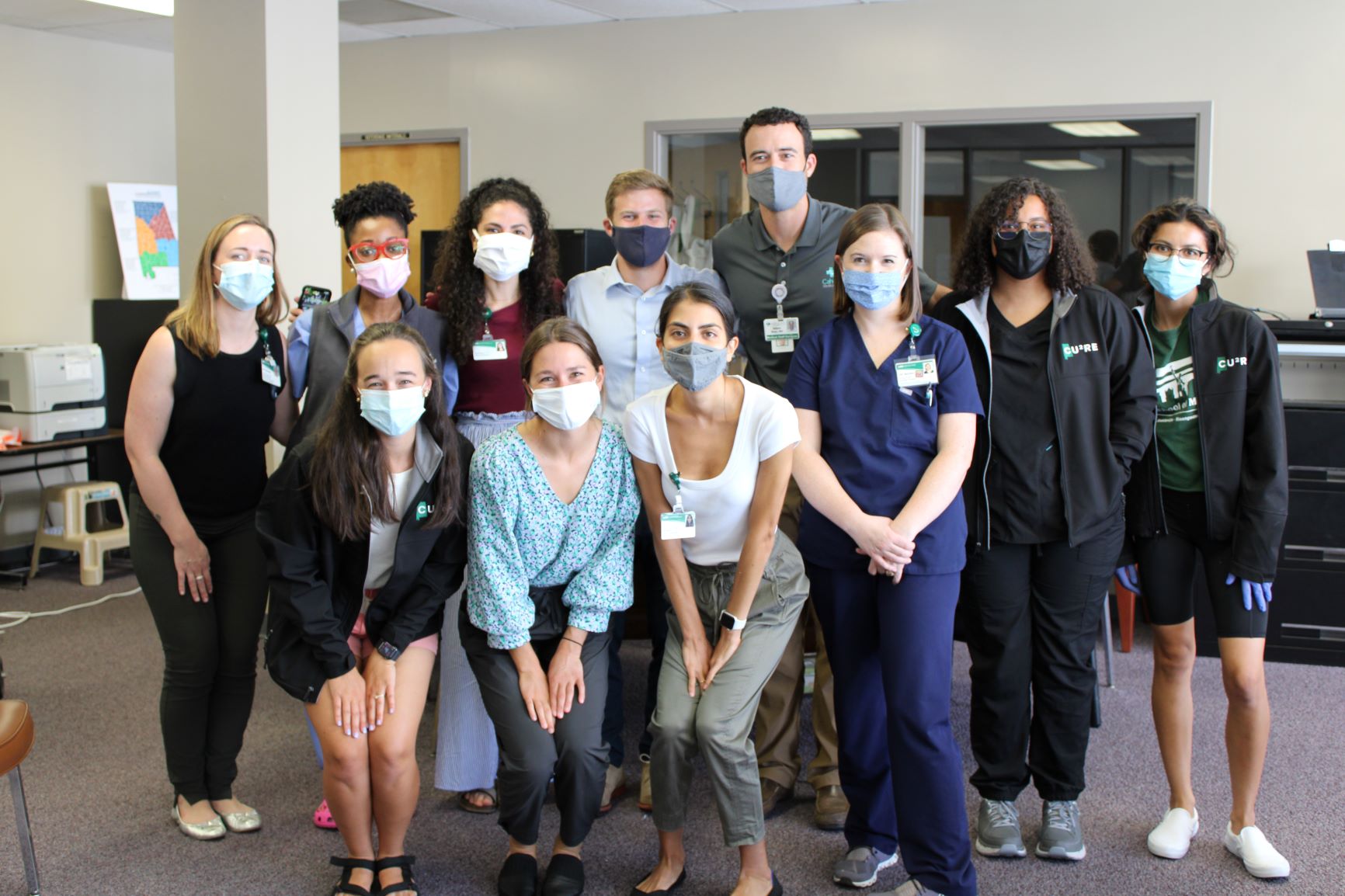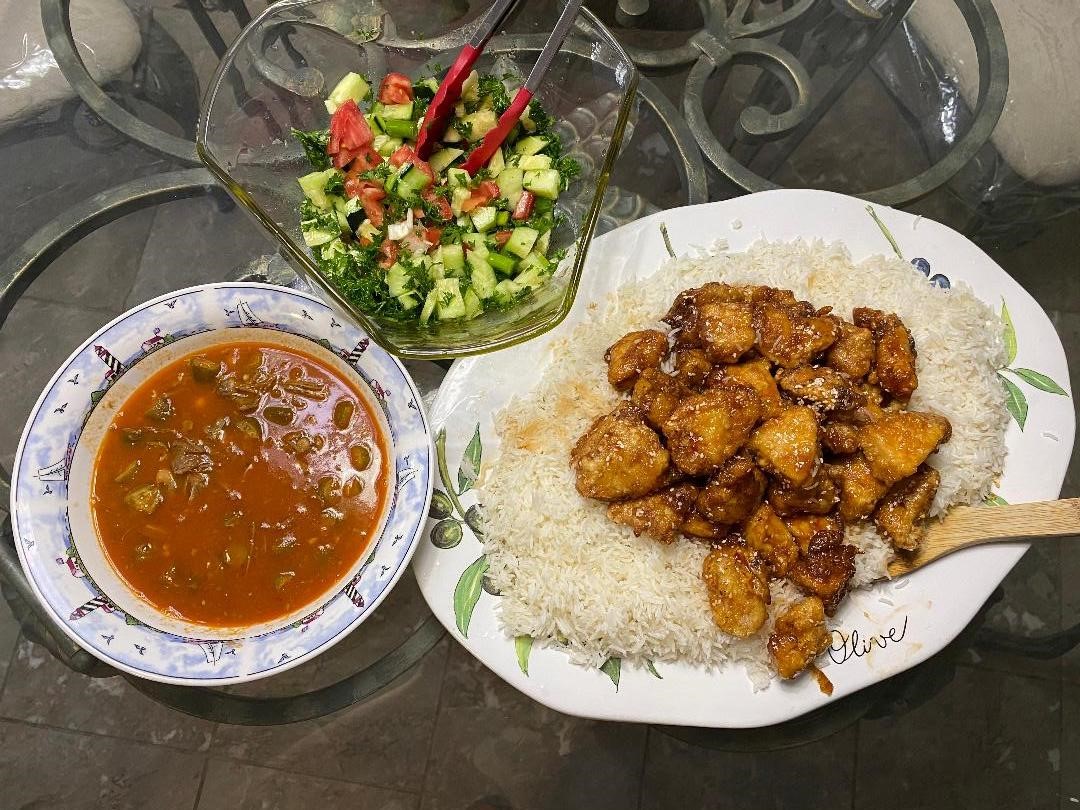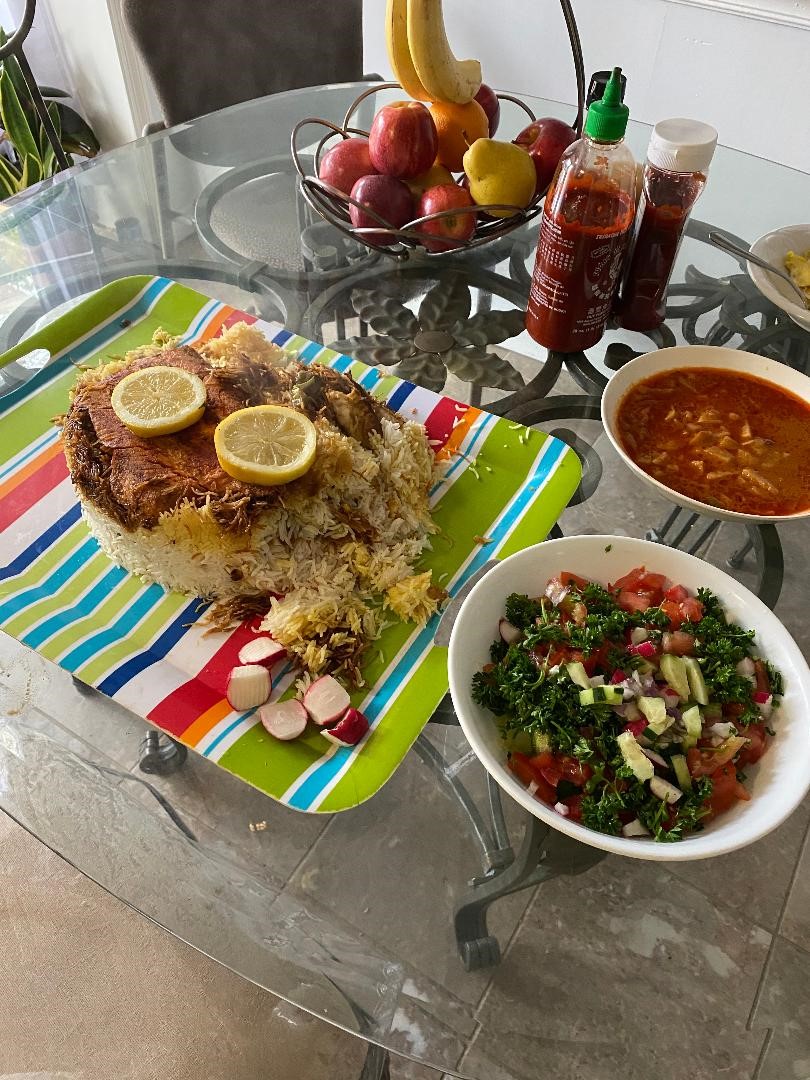U2P cohort finishes up engaging CU2RE six-week summer program
Summer programs are a common way for medical students to gain even more experience following their first year of medical school. Students might spend a few weeks researching alongside a faculty member, learning more about a relevant medical topic through elective seminars or working in a clinic. For Urban Underserved Pathway (U2P) students, CU2RE summer programming involved a full schedule of these activities and more.
The Comprehensive Urban Underserved and Rural Experience (CU2RE) program recently finished its first year. The initiative, funded by a HRSA grant in 2020, aims to increase the number of primary care providers interested in caring for underserved populations in Alabama.
U2P is the first pathway under the CU2RE program umbrella and connects students who are interested in serving underserved populations in urban areas to clinics and experiences designed to strengthen their ability to pursue careers in urban primary care. The CU2RE program welcomed eight students in the winter of 2020 to be a part of the first class of U2P students. These students participated in elective trainings, clinical hours, research and more to increase their ability to practice community-minded and patient-focused medicine.
So far, the program has given students access to more than 700 clinical hours, three skills labs, six educational modules informed by campus and state leaders, and financial stipends to offset the burden of a medical education. Students also spent 20 hours learning about social determinants of health and cultural humility, in addition to other core areas of focus. CU2RE leadership developed an engaging six-week summer program to complement the fall and spring portions of the pathway.
"Our intent with the planning of the summer program was to give each student full exposure to clinical opportunities, research, special topics and skills labs to create an unparalleled summer experience,” said Jill Marsh, M.D., assistant professor and director of the U2P portion of CU2RE. “These incredible students were able to experience many aspects of urban underserved primary care during their only summer in medical school and, we hope, had fun along the way.”
The six-week summer program included time dedicated to topics like research, behavioral health, telehealth, health disparities, social determinants of health, racism in medicine, intersectionality and more. Students also received training in dermatologic, sports medicine and women’s health procedures through skills workshops led by CU2RE and department faculty.
Jack Stein, a U2P student, shared his perspective on the summer program and its impact on him.
“The CU2RE summer program was an incredibly valuable experience. It went beyond the traditional approach of many summer programs by providing tons of clinical experience and hands-on procedural practice within the scope of family medicine.”
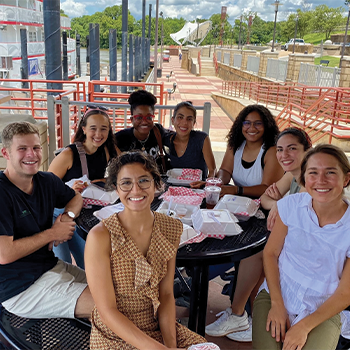 U2P students enjoying lunch during their trip to Montgomery
U2P students enjoying lunch during their trip to Montgomery
Students participated in discussions and immersive community experiences aimed at expanding their understanding of the impact that culture has on medical outcomes and treatment. Brandi Shah, M.D., MPH, assistant professor and director of the Office of Identify, Inclusion and Collective Conscience (I2C2), and Shyla Fields, program manager, took the students on tours of civil rights landmarks and museums in Birmingham and Montgomery. These experiences reinforced the lessons learned through the CU2RE modules on racism in medicine, anti-oppression and cultural competency.
“This summer with U2P was extremely impactful for me,” said Channing Bruce, a U2P student. “Not only did I get to spend a lot of time in the Department of Family and Community Medicine, I got to have meaningful discussions and attend sessions that are unique to this program.”
The integrated summer program challenged students to apply their knowledge through interactive interprofessional activities, leadership seminars and development of a 10-patient panel. Each student was also encouraged to choose a research focus and begin their scholarly activity with support from Kimberly Smith, Ph.D., assistant professor and director of the Alabama Practice-Based Research Network.
CU2RE’s growing team of faculty and staff members work continuously to innovate and provide the best experience for students to encourage interest and personal investment in a primary care career after medical school.
“Primary care is exciting and there are many ways that family medicine can help address the shortages and health status of our state,” noted Irfan Asif, M.D.
Asif is the chair of the department, associate dean for primary care and rural health for the UAB School of Medicine and the principal investigator for CU2RE.
“We want to showcase all the facets of primary care to our students and encourage them to become community-minded practitioners through exposure to important topics like social determinants of health, racism in medicine, telehealth, and much more. These student leaders are the future of primary care, and we believe our investment in them now will pay dividends for statewide health and wellness in the years to come,” said Asif.
The U2P students' participation in the summer program reinforced and elaborated on the lessons that they learned in the spring, beginning the longitudinal path all CU2RE students will experience throughout medical school. They will continue with supplemental programming as they begin another year of medical school.
“This summer, I expected to grow my understanding of what it means to be a future physician,” said Kristina Redd, a U2P student. “I had no idea that this summer would create memories that captured my soul and resonate with me in such a way that affirmed my work and calling as a healer.”
In addition to the summer programming, Marsh and Adrienne Fowler Payne, MPA, program director for CU2RE, worked to recruit and expand the program to accept more students in fall 2021 for its second year of programmatic offerings.
"We are expanding the program to include our regional campuses this year,” said Payne. “As CU2RE grows, so does our potential impact on the state. It is an exciting time to be involved with our department and we encourage all interested first-year medical students to apply.”
First-year medical students at UAB can apply to the program online on the CU2RE program’s webpage. Applications for the 2021-2022 cohort are due by September 1.
Become a preceptor: investing in the next generation of medical leaders

Earl Salser, M.D., is the director of medical student education for the departmentTo complete their medical school training, students in the UAB School of Medicine must train under practicing physicians in most specialties through third-year clerkships. The Department of Family and Community Medicine connects dozens of medical students with community preceptors each semester, giving medical students a chance to interact and build relationships with doctors in family medicine. Earl Salser, M.D., is the director of medical student education for the department and is a dedicated preceptor.
Salser has mentored students for more than 15 years and has encouraged many to find a deeper appreciation for patient-centered medicine. Salser, like other departmental preceptors, has built lasting relationships with some of his students. Jonathan Peters, M.D., is a graduate of UAB and a former student of the family medicine department. He is now a community preceptor for family medicine, mentoring and teaching students in his role as a physician at Cahaba Medical Center. Peters and Salser met when Peters was a first-year student in medical school, unsure of what specialty he would go into after completing school.
“Earl took a sincere interest in all of his students as people,” said Peters. “He wanted to encourage us beyond just medical training but through advice and empathizing with where we were in our medical journey.”
After working with Peters at a local clinic, Salser recommended that he participate in a pathway program over the summer to gain more experience in the family medicine specialty. The summer program instilled a love of family medicine and gave Peters a clear path forward as he continued his medical education.
“Earl’s recommendation helped steer my interest in medicine,” said Peters. “No one in my family was a doctor. I knew that the relational piece with patients was something that I wanted, and I was exposed to it that summer through family medicine.”
Salser says that it was natural for him to encourage students toward a career in family medicine. While each medical specialty has its benefits, Salser and others note that family medicine is an easy fit for those who enjoy creating and maintaining relationships with patients.
Before returning to UAB to work in the department and focus on medical student education, Salser treated hundreds of patients in private practice and taught students as a preceptor. Even before he created a career educating the next generation of physicians, he was contributing to their education in his clinic.
 Jonathan Peters. M.D., is one of the department's community preceptors
Jonathan Peters. M.D., is one of the department's community preceptors
“I enjoyed having students at my practice and found it intellectually challenging,” said Salser. “It made me want to be a better doctor so I could help them in their journey. When I made the switch to UAB, it seemed fitting that mentorship would be a big part of my new role. I enjoy being that connector for students to learn and find a path that they can succeed in.”
After working with Salser and other family medicine faculty members at UAB and in the community, Peters graduated and began a specialty training program in family medicine in Kansas. He went on to complete an international fellowship and work in private practice in Kansas serving rural areas. Once he returned to Birmingham, he began working with Cahaba Medical Care as one of their family medicine residency faculty members. Peters and Salser connected again as Peters began accepting UAB students in his clinic, just as he had been accepted years earlier.
“Working with students showed me that you don’t know what you don’t know until someone helps make the road a little smoother for you,” said Peters. “As a preceptor and mentor, you can turn around and do the same for someone just starting their medical journey. It is amazing to invest in others in this way and see the rewards that come out of it.”
Salser and Peters were both mentored throughout their family medicine journeys and have done the same for dozens of students. They view their contributions as a way to give back to a specialty that has given so much to them. Many of the department’s preceptors are community practice physicians who volunteer their time to train and encourage the next generation of family medicine practitioners. For family medicine, training new leaders is part of the fabric of their work and energizes these physicians as they see future medical leaders in their students.
“Teaching students revives my sense of purpose and reminds me why I got into medicine,” said Salser.
To learn more or apply to become a preceptor, visit the Department of Family and Community Medicine's preceptor webpage.
A condensed version of this story appears in the Department of Family and Community Medicine's "2020 Year in Review."
Moving Forward: HRSA Grant and the Launch of the CU2RE Program
HRSA GRANT ENABLES DEPARTMENT TO TRAIN MORE PHYSICIANS FOR RURAL AND URBAN UNDERSERVED AREAS OF ALABAMA
By Julie Cole Miller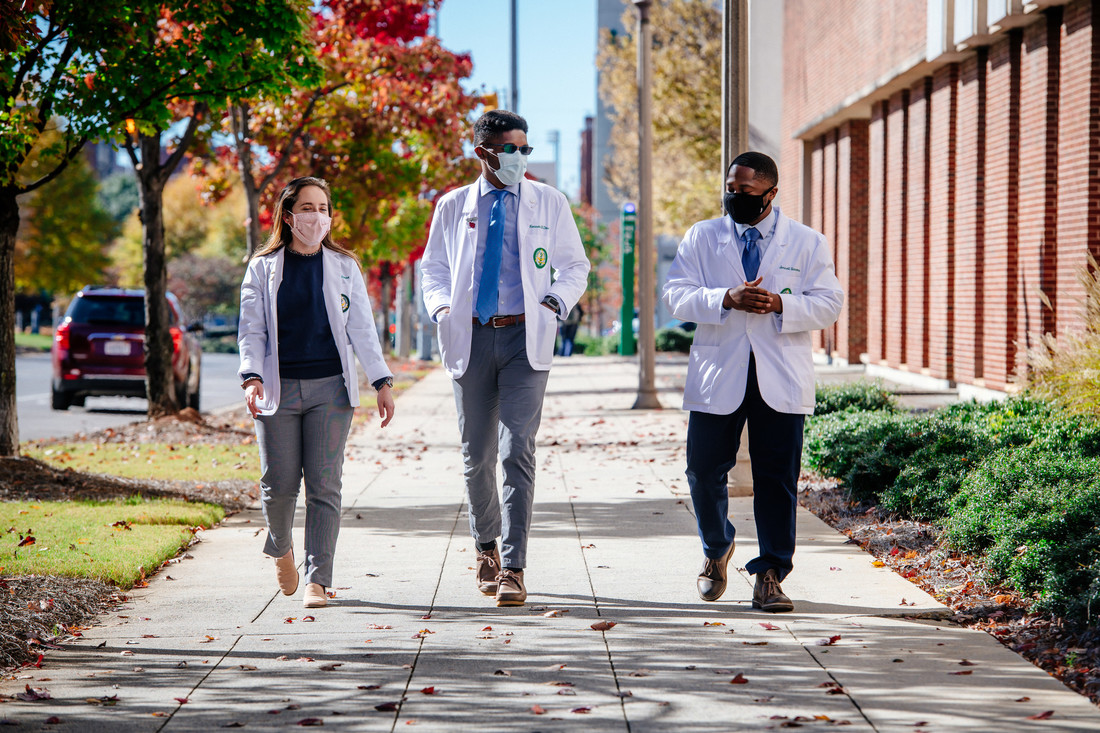 The Department of Family and Community Medicine was awarded a $7 million grant to address the need for training additional family medicine physicians to serve in rural and underserved areas of the state. The grant, from the Health Resources and Services Administration (HRSA), part of the United States Department of Health and Human Services, will enable the department to develop novel high school and college pipeline programs, medical student programming, and faculty development programs to enhance curriculum and mentoring efforts.
The Department of Family and Community Medicine was awarded a $7 million grant to address the need for training additional family medicine physicians to serve in rural and underserved areas of the state. The grant, from the Health Resources and Services Administration (HRSA), part of the United States Department of Health and Human Services, will enable the department to develop novel high school and college pipeline programs, medical student programming, and faculty development programs to enhance curriculum and mentoring efforts.
“Currently, our state needs more than 600 additional primary care pro-viders to meet the needs of the patients and the kinds of health conditions that we’ll be seeing by 2030,” said Irfan Asif, M.D., chair of the Department of Family and Community Medicine. “To address this deficit, we must be aggressive in the family medicine and primary care programming that we develop and im-plement. This grant will go a long way toward helping us achieve that goal.”
HRSA, the primary federal agency for improving health care for people who are geographically isolated or economically or medically vulnerable, has awarded the grant for a four-year term, with an annual budget of $1,750,000. Asif has begun laying the groundwork for the department’s enriched training program—the Comprehensive Urban Underserved and Rural Experience (CU2RE)—which will address six core areas related to interprofessional education, behavioral health, social determinants of health, cultural and linguistic competency, practice transformation, and telehealth.
Alabama needs to add hundreds of additional primary care physicians in the next 10 years to meet demand. “The CU2RE program will help identify, train and retain students interested in family medicine and primary care, particularly those from urban and rural underserved backgrounds,” Asif said. “We will tap into our regional campuses across the state to help broaden our reach, as well as partner with programs such as the Alabama Area Health Education Center, Minority Health and Health Disparities Research Center, Office for Diversity and Inclusion, and others to identify high school and college students with a passion for service.” Asif says the grant will help offset the challenges that the region has long grappled with, particularly in its most vulnerable populations. “With an insufficient physician workforce, Alabama struggles to adequately prevent disease; this contributes to our state ranking in the bottom five in the country for many chronic illnesses,” he said. “This HRSA grant is meant to help address the state of Alabama’s primary care workforce shortage and sets the stage for making a considerable impact on the health and well-being of the patients we serve.”
This program is supported by the Health Resources and Services Administration (HRSA) of the U.S. Department of Health and Human Services (HHS) as part of an award totaling $7 million with 10% financed with non governmental sources. The contents are those of the author(s) and do not necessarily represent the official views of, nor an endorsement, by HRSA, HHS or the U.S. Government.
THE CU2RE PROGRAM
By Erin Slay-WilsonThe CU2RE program is an educational approach that aims to ensure that more primary and family care physicians graduate from UAB ready to serve urban underserved and rural areas across the state. The program will engage first-year medical students in activities, educational discussions, and hands-on experiences thatwill educate them on the unique challenges that underserved populations face in Alabama.
In June of 2020, the department was awarded a grant from the Health Resources and Services Administration that has allowed the department to build a team and put the CU2RE plan into action. The pilot cohort of eight students, who are first-year medical students, started the curriculum in January 2021.
Through the program and the opportunities it offers, the department is poised to continue growing toward community-minded medicine over the next four years and beyond. The structure of the program will encourage regular assessment and longitudinal relationships with CU2RE students and organizations involved with the program.
Partnerships with UAB’s Huntsville, Montgomery, and Tuscaloosa campuses are integral to the program’s success, as well as collaborations with organizations like Christ Health Care and Cahaba Medical Care in Birmingham. The CU2RE mission’s cornerstone isto collaborate with students and healthcare leaders across the state
to better address issues facing all Alabamians and their access to care. In considering the potential impact of CU2RE and the importance of educating providers on the need for such a program, Asif and his colleagues are ready for a busy four years as the program is implemented.
“In 2021, I am excited about the delivery of the UABSOM’s first Urban Underserved Pathway in primary care,” said Asif. “This program aims to teach students more about differences in cultures, social determinants of health, and common medical conditions in the underserved, and also potential mechanisms to improve care delivery. In 2022, we will unite our efforts with our regional campuses to deliver similar programming aimed at caring for the rural underserved. This is a game-changing opportunity for our state, and I am thrilled to be a part of this initiative.”
Looking Ahead
Another core part of the CU2RE program is working to open a pathway for students in high school and college to pursue family medicine and primary care. A pathway is being developed to give students from around the state, especially those from underserved areas, a chance to shadow family medicine physicians and receive early experiential learning from UAB faculty members. In partnership with other pipeline programs on campus, this part of CU2RE creates longevity for the program as students are exposed to the medical field and the need for primary care in underserved communities before applying to medical school.
“By collaborating with established pipeline programs on campus, we are able to move the needle for CU2RE’s mission through widening exposure to medical curriculum to underserved areas and students studying in those communities,” said Adrienne F. Payne, CU2RE program director. “It is exciting to join with other visionary organizations in increasing access to primary care in Alabama through the healthcare leaders of tomorrow.”
The Primary Care Landscape
 Training the next generation of compassionate physicians is a statewide effort. In addition to UAB School of Medicine’s main campus in Birmingham, four regional campuses provide opportunities for educating physicians in family medicine and primary care, with concentrations in rural or urban underserved populations.
Training the next generation of compassionate physicians is a statewide effort. In addition to UAB School of Medicine’s main campus in Birmingham, four regional campuses provide opportunities for educating physicians in family medicine and primary care, with concentrations in rural or urban underserved populations.
BIRMINGHAM
UAB School of Medicine’s Birmingham campus is home to the new Comprehensive Urban Underserved and Rural Experience (CU2RE) program for medical students, as well as the Urban Underserved Program (U2P). These programs are designed for medical students with an interest
in primary care, health equity, and a heart for serving vulnerable urban communities. Over the course of the four-year program, students will have one-on-one faculty mentorship at Christ Health Center, Cahaba Medical Care, and UAB Family Medicine–Highlands. For residents and fellows, the Department of Family and Community Medicine partners with Cahaba Medical Care to offer a residency program for both urban and rural tracks, a sports and exercise medicine fellowship, and
an emergency medicine fellowship. The physicians of Cahaba Medical Care serve as adjunct faculty members in the Department of Family and Community Medicine. The department also collaborates with Christ Health Care physicians; they are affiliated with St. Vincent’s/Ascension. A multidisciplinary faculty development fellowship is also housed within the Department of Family and Community Medicine.
HUNTSVILLE
The Huntsville regional campus includes a family medicine residency program and a rural medicine program. With one of the premier family medicine residencies in the Southeast, an accredited internal medicine residency program, and the UAB Health Center Huntsville, the north Alabama anchor of UAB Medicine has the largest multi-specialty physician practice in the region. They offer required and elective clinical experiences necessary for third- and fourth-year medical students. The Huntsville Rural Medicine Program is a primary care curriculum for students with rural backgrounds, and they offer other rural pipeline programs.
MONTGOMERY
This accredited campus in Montgomery is home to programs for medical students and physicians training in internal medicine, family medicine, and hospital medicine. With 11 faculty members, 40 staff members and 82 students and residents, the Montgomery campus provides crucial clinical care and medical education within the region. A collaborative partnership between UAB, the city of Montgomery, and Baptist Health, this campus aims to help stem a shortage of physicians in underserved rural areas across the state and improve access to health care in central Alabama.
SELMA
UAB School of Medicine’s Selma location hosts a family medicine residency program and family medicine fellowship. The UAB Selma family medicine residency program has been training family physicians in Central Alabama for more than 35 years and is one of the few truly rural family medicine residency programs in the country. This program combines knowledge and resources from a world-class academic medical center with a hands-on community setting, and our residents treat a diverse patient population with a wide range of medical needs.
TUSCALOOSA
As the dedicated home for the primary care track, the Tuscaloosa Regional Medical Campus, housed in the College of Community Health Sciences at The University of Alabama, provides students with a strong foundation in clinical medicine through longitudinal experiences and special programming on population health. Primary care track students spend their third year in a longitudinal integrated clerkship (LIC). In a LIC, students work closely with physician instructors to build mentoring relationships; they also develop longitudinal relationships with patients.
Asif appointed to national Physical Activity Alliance board of directors
 Irfan Asif, M.D., chair of the Department of Family and Community Medicine and associate dean for Rural Health and Primary Care at the UAB School of Medicine, has accepted a position on the national board of the Physical Activity Alliance (PAA). Asif will take his board position as part of his leadership role within the American Medical Society for Sports Medicine and as a leader in the sports medicine community.
Irfan Asif, M.D., chair of the Department of Family and Community Medicine and associate dean for Rural Health and Primary Care at the UAB School of Medicine, has accepted a position on the national board of the Physical Activity Alliance (PAA). Asif will take his board position as part of his leadership role within the American Medical Society for Sports Medicine and as a leader in the sports medicine community.
The PAA aims to improve the lives of all Americans by championing physical activity through advocacy, policy and system changes, and community support. As a board member, Asif will join 11 other leaders in the physical fitness and health space to determine the strategic direction of the PAA and enact its national action plan.
“It has been amazing to see all of our partner organizations come together to be collaborative and unified in promoting physical activity,” said Monte Ward, PAA board president. “We are excited to have Dr. Asif join us and know that he will play a critical role in decision-making for the alliance.”
Much of Asif’s career has focused on providing safe, accessible opportunities for his patients and communities to become more physically active.
“Whether through Exercise is Medicine, volunteering with community teams, or being active myself, it is always exciting to promote physical activity as a physician and athlete,” said Asif. “The PAA is an awesome platform to educate people about the fun, rewarding side of daily activity.”
Learn more about Asif’s work and what the Department of Family and Community Medicine is doing to promote sports and exercise by visiting our website.
The mission of the Physical Activity Alliance (PAA) is to lead efforts to create, support, and advocate policy and system changes that enable all Americans to enjoy physically active lives. The PAA envisions an active and healthy nation where the opportunity for physical activity is easily available in the daily lives of all Americans. To learn more about their work, please visit paamovewithus.org.
Crockett awarded five-year NIH grant
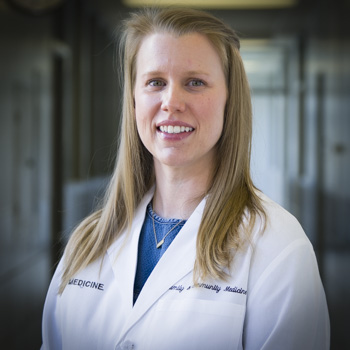 Kaylee B. Crockett, Ph.D., clinical psychologist and assistant professor in the Department of Family and Community Medicine, recently received a Mentored Patient-Oriented Research Career Development (K23) award from the National Heart Lung and Blood Institute (NHLBI), part of the National Institutes of Health (NIH). The $662,578 award will fund Crockett’s research for five years. Crockett is the first full-time faculty member in the department to serve as a principal investigator for an NIH-funded career development award.
Kaylee B. Crockett, Ph.D., clinical psychologist and assistant professor in the Department of Family and Community Medicine, recently received a Mentored Patient-Oriented Research Career Development (K23) award from the National Heart Lung and Blood Institute (NHLBI), part of the National Institutes of Health (NIH). The $662,578 award will fund Crockett’s research for five years. Crockett is the first full-time faculty member in the department to serve as a principal investigator for an NIH-funded career development award.
Crockett’s K23 research project focuses on the adaptation of a behavioral physical activity intervention with peer support for women with HIV and co-occurring hypertension. The NIH award gives researchers like Crockett salary and research support for a period of protected time to complete longitudinal and comprehensive research studies.
“This award is an enormous opportunity to develop my scientific skills with greater focus on health behavior intervention and implementation,” said Crockett. “Moreover, I get to apply these skills to understanding daily decisions women make about physical activity behavior and the social and psychological factors - like stress, social support, and self-efficacy - that affect those decisions.”
Hypertension is the most common comorbidity among women with HIV. Crockett’s research will utilize lifestyle behavior interventions to provide support for women with HIV and hypertension. Crockett aims to measure the feasibility and impact of introducing lifestyle behavior interventions, such as physical activity prescription, blood pressure self-monitoring, and peer support.
According to Crockett, the intervention is sorely needed.
“In my research leading up to this application, many women express wanting more support related to ‘whole-person health’ from providers and their communities,” she said.
Awards like Crockett’s are part of the department’s larger goal of improving physical health and mental wellness through primary care and lifestyle medicine-centered research.
“Our department is dedicated to increasing the quality of life for all patients through preventive methods, particularly through physical activity and lifestyle medicine,” said Irfan Asif, M.D., chair and professor in the Department of Family and Community Medicine and associate dean for primary care and rural health in the UAB School of Medicine. “We are proud to support and work alongside clinical scientists like Kaylee and look forward to the ways that our patients will benefit from her work.”
Abed Translates Medical Education Documents for Arabic-Speaking Patients
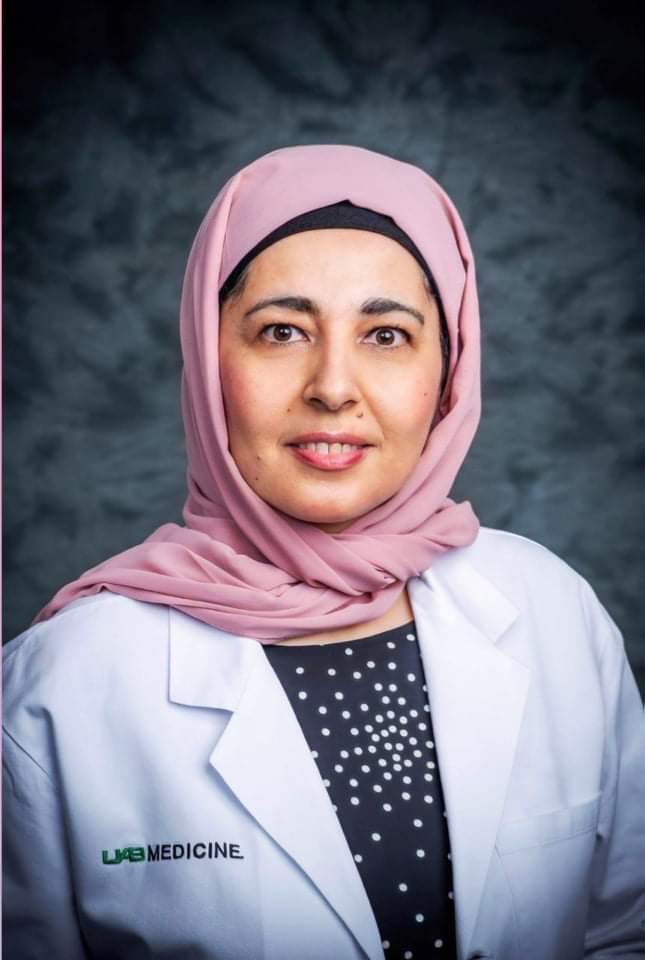 Many nights after she finished treating patients at UAB’s Hoover Family Medicine clinic this spring, Sumayah Abed, M.D., assistant professor and family physician, sat down with a stack of documents and painstakingly translated them into Arabic, often emailing her father in Iraq to double-check her work.
Many nights after she finished treating patients at UAB’s Hoover Family Medicine clinic this spring, Sumayah Abed, M.D., assistant professor and family physician, sat down with a stack of documents and painstakingly translated them into Arabic, often emailing her father in Iraq to double-check her work.
Language barriers create issues at all levels of health care for both patients and providers. Miscommunication is common and important health markers can be missed when a patient and their care team cannot communicate properly. Abed, M.D. set out to improve the way that Arabic-speaking patients receive care at UAB clinics and hospitals.
Abed is originally from Iraq and attended medical school in Mosul. Her first language is Arabic but she learned English at school and began using it regularly while working in Qatar as a women’s health physician in 2006. When she moved to the United States to complete her residency in Birmingham, she began noticing a gap in communication between Arabic-speaking populations and their health care teams.
Beginning in early 2021, Abed began a project to address these communication gaps. For more than three months Abed has used her time off to translate common patient-facing documents into Arabic. Abed worked closely with her father, Khalid, who still lives in Iraq to ensure the documents included correct grammar and sentence structure. He is an Arabic literature teacher for high school students.
So far, Abed has translated more than 10 educational documents commonly given to patients with illnesses like hypertension, diabetes, respiratory diseases, and many others. Abed’s translated documents are available to any UAB physician or care provider in the electronic medical record (EMR) system supported by UAB.
“The idea came to me because of the increasing number of Arabic-speaking patients in our clinics,” said Abed. “I wanted to create these Arabic educational materials to help our patients better understand their medical conditions.”
The greater Birmingham area is home to many Arab immigrants and Abed sees several each week in her clinic. For physicians treating these populations, many of whom speak Arabic as their first or only language, the language barrier can create issues in providing quality and comprehensive care in the clinic. Abed’s translated documents will ensure future interactions with physicians will be more accessible for Arabic-speaking patients.
The Department of Family and Community Medicine strives to build bridges to underserved populations through access to medical care and improving resources.
Unified in Pride: Interview with Jess Jernigan
The Department of Family and Community Medicine works to educate students and faculty on the importance of elevating diverse voices and addressing health disparities, social determinants of health, racism, and access to care issues within the primary care space. As part of the School of Medicine’s Unified in Pride series, Brandi Shah, M.D., MPH, and Program Manager Shyla K Fields spoke with Jess Jernigan, web content coordinator for the department, to discuss her experiences related to identity, access to healthcare, and more.
Shyla: Please tell us who you are, your profession, your age if you'd like, and how you identify in the LGBTQ+ community.
Jess: I'm Jessica Jernigan. I'm 24, a web content coordinator for UAB, and I identify as bisexual.
Shyla: How open are you about your sexual identity or gender identity at work, at school, at home, or with new acquaintances?
Jess: In a professional setting, it doesn't come up in a natural conversation, but with my friends and family, they all know. When I meet new people, it's not something I just go up and tell them. I've worked with a lot of bisexual women. It just determines not necessarily a romantic relationship. But say I was in a relationship with a man, it's not something that I would outright disclose, but I'm pretty ‘out,' and my bosses know just because of personal conversations you have with your coworkers. But yeah, I would say I'm as out as can be.
Shyla: That's excellent. What does bisexuality mean to you?
Jess: Many people I've come across and even discovering my own identity, it's not even so much your romantic preference. It's so much of who you are embedded in your personality and your character. It's how you see the world, and you treat other people. So even if I didn't have a relationship with a woman or a man. It would still be so much of my identity. It's kind of ingrained in my character if that makes sense.
Shyla: Yeah. What identity do you prefer to be addressed as in your professional and personal community?
Jess: I’m bisexual. I’m part of the LGBTQ+ community, and a lot of times, people just assume I'm straight, but I'll correct them if I need to.
Brandi: How do you do that? Jess, can you give an example of how you correct people?
Jess: If I'm out with new people or friends and they say something like, when was the last time you went on a date with a guy. I'll say, actually I don't just go out with men, I also go out with women, or I'll try not to put emphasis, so they don't feel embarrassed for assuming. Or I'll slip in; you know, I went out with a woman, or I was interested in her too just, so they're aware, and it doesn't draw too much attention to it because I don't want them to feel they've messed up. I keep it casual, and if they have more questions, obviously, I'll answer.
Brandi: How do people usually respond to that?
Jess: Usually, the times it's happened they'll respond, ‘I didn't know,’ or they just get past the conversation really fast. And I don't think it's because they are, against it or anything. It's just their own personal feeling, like, I didn't mean to slip up or feel dumb for assuming.
Brandi: And have you always been this comfortable talking about your sexuality, or can you recall a change, a moment or threshold when you were just like, this is just how I'm going to talk about it, and the people are going to come along.
Jess: I knew I was bisexual when I was really young. Obviously, I didn't know the term because I was probably 10 or 11, but I really felt comfortable when I got to college. I was surrounding myself with people who I just never really knew before. I remember specifically working for a magazine in college. My boss identified a lesbian woman and talked to me about her experience. It wasn't something that I necessarily talked with my friends about. We would just say it in passing, but I never really looked at it as something that I would label myself as, and I think I felt really comfortable with her (my boss). I would ask my boss questions about it because we were researching LGBTQ members and sororities. It's something that wasn't talked about. She told me about her experience, and it just made me reflect on how I present myself and how I actually wanted to be seen by the world, and how I want to see myself. And then I slowly started to come out to people in my life. I told my family 1st, then my friends. The more people I told, the more comfortable I would say it with myself. I feel like I kind of spoke it (identity) into existence, something that I always felt for myself, but it was more personal. The more I talked about it, the more accepting I felt of myself and accepted by other people. Yeah, it was my boss that helped me the most.
Brandi: Now that was that was beautiful. That really is. I think that's very important to say here.
Jess: And it was because it was in a professional environment too. In my experience at other jobs, they don't necessarily treat me differently, but they can make small comments, not necessarily support. It's more of an interest. Because we live in the South, and you don't see bisexual people a lot, at least in my experience.
Shyla: Do you feel the comments are microaggressions?
Jess: Well, I think bisexual women are hyper-sexualized in a lot of situations. That is a huge part of why I don't share my identity until I feel comfortable. There's a really big stigma around that, and I want to control how people view me. It's not that I'm not proud. I just think there is a lot of power in controlling your narrative and who you want to share information with. I think about this all the time. Letting people know that you're very intentional with the information you share. It's not that I'm disrespecting my community. It's how I want to operate in my professional world and my personal relationships.
Shyla: Yeah, that’s totally understandable. What I hear is, it's a form of protecting yourself professionally and personally.
Jess: Yes, exactly.
Shyla: Yeah, and a form of advocating for yourself.
Jess: And I would never hide or anything. I also don't think there is any shame in hiding, and any opportunity I have to correct someone or educate them a little more, I'm happy to do that.
Brandi: Have you had an experience you can compare where one was a more affirming and appropriate encounter medically and then compare it to one where it wasn't?
Jess: Well, I've never had a bad experience in a clinical setting because, as a bisexual woman, we have that straight passing ability. Everything that I would be checked for would be the same, there is no crossover. In a medical setting, I've never really had to disclose my sexual identity for my health. It's never been a conversation that's been brought up because I am a woman. But I know it's different for, non-binary or bisexual men.
Brandi: Well, from my experience working with young people, for adolescents and young adults, some of the evidence that we always try to stay on top of is understanding the spectrum of sexuality and gender identity, particularly for bisexual-identifying people. Sometimes I think what you just described can be more invisible in terms of their health care needs, and often what we see at the population level is higher unintended pregnancy rates and higher STI rates. When you look at the population level at the individual level. One of our challenges is, what are we not doing right to make them more visible? Make them still more comfortable talking about their sexual identity and the sexual behaviors that we can help. To help reduce risk or and offer them all of the services that they should have access to. So do you have any sort of thoughts on that?
Jess: Being very selective with your language and, of course, never implying their sexuality. If I'm with my doctor and they asked me if I'm sexually active. Half the time, a lot of women will say this too; They'll say they are not sexually active because they think they can't get STIs if they are sexually active with a woman. I think physicians should share that you can contract STI’s without having penetrative sex or have open conversations about it. Half the time, people wouldn't disclose anything like that because maybe they weren’t necessarily in a relationship with a man, they think that that doesn't correlate if you're with a woman.
Brandi: Ok. I'll tell you what I do with my patients, and you can tell me that's if it's ok, or not ok, alright? This is what's recommended through CDC guidelines and all sorts of policy statements about how we should be engaging with people around, taking sexual history, especially with young people. I ask, have you ever been sexually active, or are you having sex currently? I also ask, are you at risk for anything right now that we should talk about? Then I'll say, are your partners male, female, or non-binary? If I know something else about the patient where I know it's not just on the binary. I say that quickly, and it opens the conversation up for them to say, well, most of my partners are male, but I've had some female partners in the past. And then I'll ask, what is sex for you? Is sex, Penis in the vagina? Is sex penis in mouth? Is it mouth on some other body part? Something in the anus? I've learned to use anatomical language because it's the anatomy that I need to be screening. So if all of those sites are involved in sex, I want to offer you screening for all of those sites in the case. And like bisexual women or women who identify as lesbian, some other things come up. There's certainly a risk of throat infections, but also we see higher rates of BV. There are moments where we could be doing individualized counseling about particular sexual health. Based on this sexual behavior, and I know that that doesn't happen with everybody. That's what I do because I know that how someone actually identifies is not the same as what kind of sex they're having and what I can provide as a clinician.
Jess: No, that's perfect, I wish more doctors would do that. When speaking with my physician, going over the standard list of questions (are you sexually active? chance of pregnancy?) and saying no, the questions stop there. Too often, conversations carry out with no space to convey that someone may be bisexual or have partners of the same sex. It is important for the patient to disclose their sexual history for their doctor to perform an accurate clinical assessment for health needs. And part of doing that is leaving space for that conversation between the lulls in the questions. As someone who identifies as bisexual, that means that my medical assessment could change, and having my physician know that is critical. A way for both the patient to feel comfortable and for the doctor to receive a clear understanding of the patient’s needs would be to have an open and comfortable conversation to ask questions that don’t necessarily assume one’s sexual orientation based on the gender of current partners.
Shyla: Yeah, so it's more of the general questions that speak to the anatomy that Brandi spoke of and the education on different sexual practices.
Jess: Exactly. Show the person how to properly protect themselves even when they’re not sexually active with another person's body.
Shyla: When we talk about being within the community, people know that you're Jess, your sexual identity. Are you also an advocate? What title do you hold?
Jess: It's so much ingrained in me. It's just something that I carry around with me. Part of being an ally is, yes, it's educating others. But it's also checking yourself, and because often, we'll all have some internalized negative thoughts about ourselves. I'll have to keep in check with my own mindset as well as with other people.
Jess: It's just so much of who I am. I don't know how to explain it. It's just supporting people when they need support and lending a hand before they even ask.
Shyla: If this was your Ted talk, speaking to health care providers, what would be the one-liner of what affirming care looked like for the LGBTQ+ community?
Jess: Being more intentional with how they bring up the conversation about it (sexual identity). I would feel more comfortable if, say, I was in a clinic setting or in the waiting room and see a sign to let me know they are inclusive. Even if it was just an LGBTQ pride flag or the bisexual symbol, I would immediately feel comfortable with them. It's also being unbiased as possible, like how Brandi talked about it. You're looking at the person's anatomy. You're not looking at their interior life. You're looking at how you can help them. It's who they are as a person. You're there to help them health-wise. I would feel more comfortable if my doctor was less involved in my interior life and more involved in how I view myself as a patient, better my health, and not look at my identity or my identifier.
Shyla: That's a perfect one-liner, "looking at me as far as how you can best serve my body versus how I identify or my identifier." How have you found, formed, and kept your community or communities together?
Jess: I don't know, this out of pocket to say, but I gravitate toward people who, you can just tell when someone is a gentle and open-minded person. I feel like because you know my identity and how I identify sexually, even though I think bisexuality and any sexual identity, again, has nothing to do with sex. It's so much of who you are as a person. I feel like it's very easy to gravitate to other people like that. So, even with my friends and my family, who are also part of the community somehow, we just check in with each other and see how the other person is constantly doing. If my friend says someone made an offhand comment to me at work today, they made a gay joke. We'll talk about it, and we'll think of how you can approach it the next time a comment was made. Just constantly checking in, and that sounds obvious, but so many times because there is no conversation, people just assume that something is being done when it's not. Even if it's something small, keep the conversation going. I've read and have seen much backlash about corporations "putting on" for Pride Month and its performative allyship. Still, even if it's performative, even if it's a capitalist gain, I would have loved to see that when I was a child. I would have loved to have gone into Target and see a rainbow flag! Is it disingenuous? Maybe, but does it make me feel comfortable? Yes! I would have loved to have seen that. It makes a huge difference. Even if it is performative, it's something.
Shyla: Yeah, representation matters.
Shyla: Brandi, do you have any more questions?
Brandi: I don't think so, but I feel like I could talk to you like all day, Jess, because representation does matter and visibility matters, and I really appreciate you. We talk about seeing others, and there's action and intention in that. But it also takes what you were describing earlier. It is a form of self-advocacy to decide if and when you're going to disclose something and how you want to be seen by the rest of the world. There's empowerment in that. And the openness and thoughtfulness that you clearly have with just this one part of your identity and how it interacts with all the other parts that we haven't even been able to talk about. It's critical for people and clinicians to hear that to know and understand how to check bias and check stigma that we intentionally or unintentionally bring into the exam room.
Shyla: What else should we know about you? How do you feel about Pride Month, healthcare, your profession, and how that intertwine?
Jess: These identifiers, they're just facets of a larger person. I can say my name is Jess, I'm bisexual, and I'm a communications coordinator. But if more people would look at people as a whole person and not just corners of their being, acceptance would come a lot easier. I think pride month is about supporting others, fighting for what's right in your own way. But it's also taking stock of your own mental health and taking stock of how comfortable you feel when you go to bed at night and how you think about yourself. It's such a personal thing, and if you feel comfortable sharing with other people, that's your right. There's a lot of power in knowing these things about yourself. You don't necessarily have to shout it to the world. It looks different for everyone, and people need to understand that. It would have helped me as a child and even going into a young adult. If I had known that. I would have been a lot easier on myself because there's just a lot of pressure. To speak up, but speaking up looks different for a lot of people.
Shyla: That is a beautiful way to end the interview. Thank you so much.
Hello, Goodbye 2021: Sports and Exercise Medicine Fellows
As the summer heats up, it's time to welcome our new sports and exercise medicine fellows and say goodbye to our graduating trainees as they move forward in their careers. In partnership with Cahaba Medical Care, the Department of Family and Community Medicine's Sports and Exercise Medicine Fellowship program is a unique two-year fellowship that offers individuals an opportunity to gain hands-on, comprehensive sports and exercise medicine experience while also obtaining a master's degree in exercise and nutrition. Each fellow plays an essential role in caring for athletes of all ages, including organized sports at the professional, collegiate, and high school levels.
Learn more about the new class and graduating fellows below.
Hello:
On July 1, the program will welcome two new fellows, Matthew Miesch, M.D., and Christian Muller, D.O., to the team.
"I'm excited to have such a great pair of fellows coming in to help us take this fellowship to the next level," said Ian McKeag, M.D., sports and exercise medicine fellowship director. "They both come from great programs and have fantastic attitudes. It's going to take some hard work and grit, but I believe these two can help us get there."
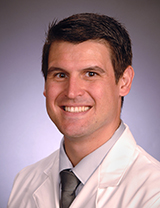
Matthew Miesch, M.D.
Hometown: Mount Pleasant, Michigan
Medical School: Ross University School of Medicine
Residency: Family Medicine, University of Connecticut, Hartford, CT
Why I chose UAB: You cannot beat training in the southeast for football sideline coverage! The Division 1 athletic coverage was a huge draw for me. I also love how the program emphasizes research as a key part of the fellowship training.
Looking ahead: I'm most looking forward to honing and sharpening my ultrasound skills (injections, diagnostic, etc.). I am also very much excited to begin working with Dr. McKeag!
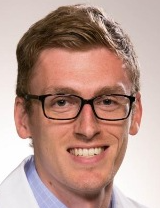
Christian Muller, D.O.
Hometown: Pine Bush, New York
Medical School: Touro College of Osteopathic Medicine, Middletown, New York
Residency: Family Medicine, Rowan School of Medicine, Stratford, New Jersey
Why I chose UAB: I find the sports and exercise medicine program to have incredible leadership, ample opportunities to help me grow as a doctor, and all I need to reach my goal of being a sports medicine physician.
Looking ahead: I'm most looking forward to the sideline coverage that is in my near future — high school, club, college, and professional. UAB has a great mix of it all, including the 2022 World Games!
Goodbye:
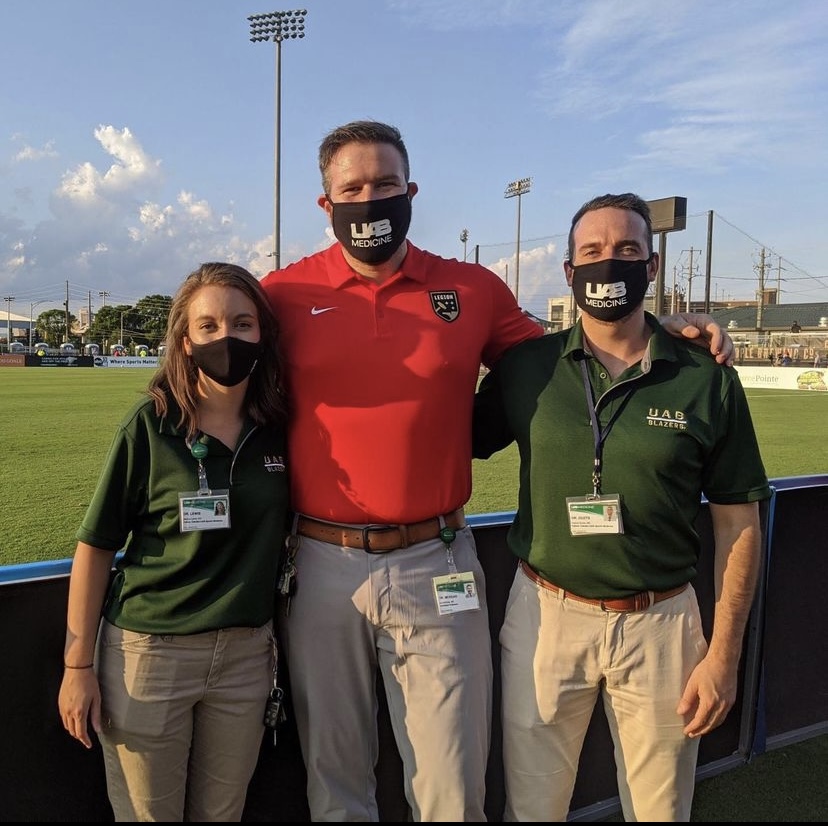 Pictured left to right: Mallory Lewis, D.O., Ian McKeag, M.D., Patrick Ouzts, M.D.Congratulations to graduating fellows Mallory Lewis, D.O., and Patrick Ouzts, M.D., as they enter the next chapter in their professions. As fellows during the COVID-19 pandemic, Lewis and Ouzts were able to adapt and provide continuous quality care to their patients despite the selective pressure.
Pictured left to right: Mallory Lewis, D.O., Ian McKeag, M.D., Patrick Ouzts, M.D.Congratulations to graduating fellows Mallory Lewis, D.O., and Patrick Ouzts, M.D., as they enter the next chapter in their professions. As fellows during the COVID-19 pandemic, Lewis and Ouzts were able to adapt and provide continuous quality care to their patients despite the selective pressure.
"I have loved having the opportunity to expose [Lewis and Ouzts] to the various experiences we have here at UAB," said McKeag. "My favorite of these were the initial Birmingham Legion FC games when they had just begun fellowship, and the coverage at the Birmingham Bulls hockey games, which was a unique atmosphere compared to the rest of the coverage we provide."
Both Lewis and Ouzts have accepted positions across the country, practicing a mix of sports and family medicine care.
"Mallory and Patrick hold the potential to make a huge impact in their respective communities as their careers grow," said McKeag. "They both have their own style, gifts, and swagger."
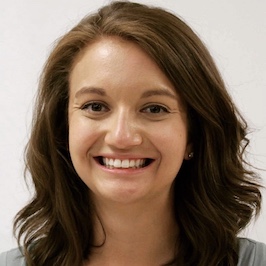
Mallory Lewis, D.O.
Hometown: Fort Worth, Texas
Residency: Family Medicine, University of Oklahoma
Favorite fellowship memory: The opportunity to work with Division 1 athletes
Favorite sport to cover: Football and soccer
Next steps: Ascension Sacred Heart in Pensacola, Florida. I will be in a private practice clinic doing a combination of family medicine and sports medicine.
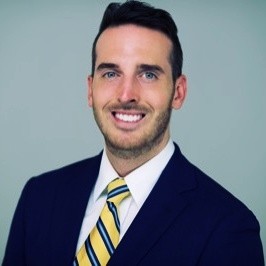
Patrick Ouzts, M.D.
Hometown: Cleveland, Ohio
Residency: Family Medicine, Rutgers University, New Jersey
Favorite sport to cover: I love all sports, but especially covering soccer and football.
Next steps: I will be relocating to Tucson, Arizona to work for Northwest Medical in an outpatient practice doing both sports and family medicine.
Faculty Development Fellowship applications open for 2021-2022

The Department of Family and Community Medicine, in partnership with the UAB Center for Teaching and Learning and the Center for Clinical and Translational Science, began offering a 10-month primary care faculty development fellowship in 2019. Since then, 17 fellows have completed the program and 16 more are set to graduate on June 11, 2021.
The fellowship invests in senior residents and junior faculty who are interested in academic medicine and educating medical students. Focus areas include teaching, scholarship, leadership, and practice transformation. Michael Wiederman, Ph.D., director of the Office of Leadership and Professional Development, and Irfan Asif, M.D., department chair and associate dean for rural health and primary care, co-direct the fellowship alongside Becky Reamey, Ph.D., program director for the Center for Clinical and Translational Skills Training Academy, and Scott Phillips, Ph.D., director of the Center for Teaching and Learning.
“When I first came to UAB, many faculty members on campus and at our regional campuses wanted more training and professional development,” said Asif. “This fellowship offers participants the chance to grow in a rigorous and collaborative program.”
Fellows attend monthly training sessions on Fridays each month, conduct a group study project, develop a teaching philosophy and leadership statement, and learn from primary care and professional development experts throughout the fellowship.
“The fellowship enriched my professional skills, my teaching techniques, and uplifted my capacity in research writing,” said Sumayah Abed, M.D., assistant professor in the Department of Family and Community Medicine and 2021 graduate of the fellowship. “Most importantly, it expanded my professional network through the monthly opportunities to meet with leaders in my field, mentors, faculty members, and others who widened my scope of vision as a faculty member.”
The fellowship is open to family medicine and primary care senior residents, junior faculty, and faculty members. The 2021-2022 fellowship application is now open.
Learn more about the Faculty Development Fellowship here or by contacting Michael Wiederman, Ph.D.
Honeywell receives G. Gayle Stephens, M.D. award
 Each year, the Department of Family and Community Medicine presents the G. Gayle Stephens, M.D. Award to a graduating medical student pursuing family medicine. Recipients are selected based on demonstrated leadership, professionalism, academic performance, and interpersonal skills. Brandon Honeywell, M.D., was presented with the award during a virtual ceremony on May 20, 2021.
Each year, the Department of Family and Community Medicine presents the G. Gayle Stephens, M.D. Award to a graduating medical student pursuing family medicine. Recipients are selected based on demonstrated leadership, professionalism, academic performance, and interpersonal skills. Brandon Honeywell, M.D., was presented with the award during a virtual ceremony on May 20, 2021.
This award honors G. Gayle Stephens, M.D. and his contributions to family medicine throughout his career. Stephens served as the first dean of the School of Primary Medical Care in Huntsville, Alabama, and was a chair of the Department of Family and Community Medicine at UAB. Beyond his clinical achievements, Stephens also founded one of the first family medicine residencies in Wichita, Kansas in 1969. After his retirement, Stephens was named a professor emeritus of family and community medicine at UAB in 1988.
While a medical student, Honeywell served as a co-head coordinator for the Internal Medicine Interest Group, was a member of the Argus Society, and volunteered at the COVID-19 Contact and Recovery Tracing site at UAB Hospital. Honeywell also worked as a peer mentor for medical students, a clinical skills teaching associate, and completed several scholarly research projects with UAB School of Medicine faculty. He is a member of the American Academy of Family Physicians, American Medical Association, and the American College of Physicians.
“Brandon built great rapport with patients and staff, and showed excellent medical knowledge and skill during his time in medical school,” said B. Earl Salser, M.D., director of medical student education and associate professor for the department. “He will make an outstanding future family physician.”
When asked about his future as a family medicine physician, Honeywell remarked on the impact the specialty has had on his life.
“Family medicine has been a part of my life since as early as I can remember as my father is a family physician,” said Honeywell. “I chose to pursue family for two reasons: the long-term patient relationships and the broad scope of practice available to practitioners. This is a very rewarding field.”
Honeywell will complete a family medicine residency at Wake Forest Baptist Medical Center beginning this year. The department would like to congratulate Honeywell on this achievemen
Celebrate physical and mental health during May with our sports medicine faculty

May is both National Physical Fitness and Sports Month and Mental Health Awareness Month, but did you know that these two topics share some of the same best practices?
With so much information available on how to keep healthy and fit, it can be overwhelming to focus on the best way to take care of yourself. Faculty members from the Department of Family and Community Medicine worked together to share four tips for maintaining a healthy mind and body.
Tip One: Get up and out, every day
Ian McKeag, M.D., is the program director for the UAB-Cahaba Sports Medicine Fellowship and an assistant professor in the department. He tells his patients to set a goal and to move their bodies for a set amount of time each day.
“Not everyone has the ability or the finances to join a gym, but nearly everyone can walk,” said McKeag. “Tell yourself that you are going to be out of the house or active for a least 30-60 minutes per day and stick to that goal.”
McKeag noted that setting a time-based goal helps his patients improve mobility over time and encourages physical activity in an accessible way.
Tip Two: Being active counts
“Remember that being ‘active’ counts as exercise,” noted Kim Fagan, M.D., associate professor and chief of the department’s sports medicine division. “Work in the garden, take the stairs at work, do squats while you talk on the phone, or complete a simple arm workout while watching the news.”
Fagan encourages her patients to have an active mindset and reminds them that small activities throughout the day add up to increase physical strength and health.
Tip Three: Build habits to support mental health
According to Kaylee Crockett, Ph.D., assistant professor and clinical psychologist, many people have gotten more creative about their physical activity routine during the pandemic.
“Studies have shown that individuals of all ages who maintained or increased their physical activity during the pandemic reported less anxiety and depressive symptoms, and a greater sense of well-being,” said Crockett.
By prioritizing physical activity and exercise, Crockett says that people can improve their mental health and general outlook.
“Now is a good time to reflect on what works well in terms of physical activity, especially as we transition back to ‘normal’ in the coming months,” she said. “Routines like the make-shift home gym, lunch hour walks or activity breaks, and increased outdoor time are worth keeping as ways to improve and maintain mental health.”
Tip Four: Find something you enjoy (and hydrate!)
Irfan Asif, M.D., chair for the department, asks his patients what they enjoy when encouraging increased physical activity.
“Don’t let yourself get discouraged if you don’t like a certain type of exercise,” said Asif. “The most important part of physical activity and exercise is staying active doing things you enjoy and trying new things to keep yourself motivated.”
Asif also reminds his patients and others to stay hydrated while completing workouts or outdoor activities. He recommends drinking water every 15 minutes during an hour of exercise and drinking a beverage with electrolytes if the activity exceeds an hour, especially during the summer.
Physical activity and exercise play a vital role in overall health and wellness, including mental health. As summer approaches, explore new ways to stay healthy with these physical activity and wellness tips from the Department of Family and Community Medicine.
Faculty highlights from the Annual AMSSM Meeting

The American Medical Society of Sports Medicine (AMSSM) is an organization dedicated to supporting growth in the sports medicine field. AMSSM offers educational resources, research opportunities, and collaboration among sports medicine physicians around the world. Irfan Asif, M.D., chair of the Department of Family and Community Medicine, has been involved with AMSSM since medical school.
Read moreDepartment offers three new course electives for medical students
 As part of the School of Medicine’s spring 2021 curriculum offerings, faculty in the Department of Family and Community Medicine led three elective courses related to research, inclusion, and leadership. Each course allowed students to learn more about their interests and space to explore new ideas related to their future careers in medicine.
As part of the School of Medicine’s spring 2021 curriculum offerings, faculty in the Department of Family and Community Medicine led three elective courses related to research, inclusion, and leadership. Each course allowed students to learn more about their interests and space to explore new ideas related to their future careers in medicine.
Holding Space: Power of Storytelling in Medicine
Brandi Shah, M.D., MPH, is the director of the department’s Office of Identity, Inclusion and Collective Conscience. Shah practices at the Student Health Clinic on campus and is an active community advocate for equity in healthcare. Shah led an elective course intended to help students understand the importance of storytelling and relationship-building with patients as they continue their medical training.
Shah met with four students—two MS2s and two MS3s—weekly to collaborate with them and their community storytellers. The first few classes introduced students to community engagement and story work. After these discussions, four class sessions were devoted to rapport-building with the group and activities aimed at helping the students engage with stories in an empathetic and creative way. The last five weeks of the course gave students time to complete the storytellers’ digital stories for an exhibit at Vinegar Contemporary, a local arts nonprofit.
The community storytellers shared their experiences with the students and collaborated on a digital presentation of some of their medical experiences as members of the LGBTQIA+ community.
“I offered this course because I believe that stories and storytelling/sharing are at the core of medical practice and relationship building with patients,” said Shah. “The most rewarding part of the course was witnessing the personal and group transformations that occurred between and because of the medical student and community storyteller interactions.”
Jasper Kennedy was one of the students in Shah’s class this spring. Kennedy remarked on the impact the class had on their education and future career.
“Being part of the course helped me practice one of the most valuable skills a physician can have—how to bear witness to another person’s struggles,” said Kennedy. “It was so impactful to collaborate with members of our community who are often silenced and to get their stories out into the world. I’m grateful for the vulnerability that our storytellers showed in sharing about their lives and specifically their interactions with the healthcare system. I will be taking the listening, support, and advocacy skills I gained in the process into my future interactions with patients.”
The students’ and community storytellers’ digital stories exhibition, “Holding Space: One Entity Embracing All,” is available for screenings on Saturdays from 10 a.m. until 2 p.m. or by appointment at Vinegar through May 15.
Shah plans to offer the course again in spring 2022. Interested students may reach out to her or to the Office of Identity, Inclusion, and Collective Conscience to learn more.
Health Psychology and Wellness in Primary Care
Michael Wiederman, Ph.D., director of the department’s Office of Leadership and Professional Development, held his second elective course this spring after a successful course on leadership in fall 2020. Wiederman explored the importance of psychology in primary care with his class, which was made up of 11 students in their second and third years of medical school.
“I was really impressed with the attitude of these students,” said Wiederman. “They invested in this course and took a collaborative approach to their learning and development.”
The course included pre-work reading and recorded lectures to study before virtual meetings, where Wiederman led discussions and active application exercises based on the material. Wiederman decided to offer the course to give medical students the chance to deepen their understanding of the scope of primary care and the application of psychology practices, such as motivational interviewing and intentional referring, in treating patients with mental health concerns.
Even if students do not continue into a psychology specialty, this course helped them become better physicians by exposing them to potential mental health hurdles that future patients may face, noted Wiederman.
“The course was an invaluable class during my second year,” said Paris Long, a second-year medical student in the course. “It gave me the ability to practice my motivational interviewing skills in an environment that was both comfortable and conducive to learning.”
Wiederman plans to offer a similar course in 2022. Interested students can contact him for more information.
Clinical Research Experience: COVID Pandemic
Kimberly Smith, Ph.D., director of the Alabama Practice-Based Research Network offered a course on clinical research that explored topics related to completing a clinical research project while in medical school. Fourteen medical students, representing all years of medical school, participated in the course.
Each virtual session included didactic training and time for breakout group discussion and application of the research skill discussed that week. Smith covered how to set up a research question, create a survey, analyze data sets and more. All medical students are required to complete scholarly activity before graduating, and this course offered a look at how to approach future research activities.
“It was great to feel like I was empowering the students to research topics that they were passionate about this semester,” said Smith. “Research can be perceived as boring, but we were able to get these students excited about it because they chose topics that were important to them and encouraged them to explore their interests.”
As the course title suggests, students were asked to pick topics related to the COVID-19 pandemic and worked with Smith to study topics ranging from comorbidities to related conditions and the lasting impact of the illness.
James Crenshaw, a first-year medical student in the School of Medicine, completed the course and a research project on the impact of obesity on COVID-19 symptom severity.
“The COVID-19 Clinical Research course taught by Dr. Smith provided a valuable learning experience in clinical data analytics, employing the scientific method, and writing manuscripts,” said Crenshaw. “I learned to generate impactful research questions, develop an effective REDCap questionnaire, translate and analyze survey data, and produce a poster presentation yielding my findings. The process of gathering insights on COVID-19 symptom manifestation in obese populations was a rewarding project to work on during the pandemic, bolstering my understanding of the occult mechanisms of coronavirus and enhancing clinical research skills that I will utilize throughout my medical school career."
Smith plans to offer a similar course next year and encourages students to reach out to her for ways to get involved in research within the Department of Family and Community Medicine or through the Alabama Practice-Based Research Network online.
For more information about how the Department of Family and Community Medicine is working to educate the next generation of medical leaders, visit our website.
Get to Know: Family Medicine Interest Group Leadership
The Family Medicine Interest Group (FMIG) is a student-led organization that empowers medical students on campus to learn more about the family medicine specialty. There are similar interest groups on campus for other specialties that offer a place for medical students to ask questions, plug into professional organizations and learn more about the departments that represent these specialties on campus.
The Department of Family and Community Medicine’s FMIG recently completed selections for its 2021-2022 executive leadership team. The team includes four medical students, all in their first year, who will collaborate to plan events and work with their departmental advisor, Ksenia Blinnikova, M.D., to increase interest in family medicine among their peers. Fallon Lalor, Dalton Frederick, Claire Wilson, and Hope Cain will serve the organization this year. Each student has a different perspective on family medicine and looks forward to a successful year in FMIG.
Hope Cain
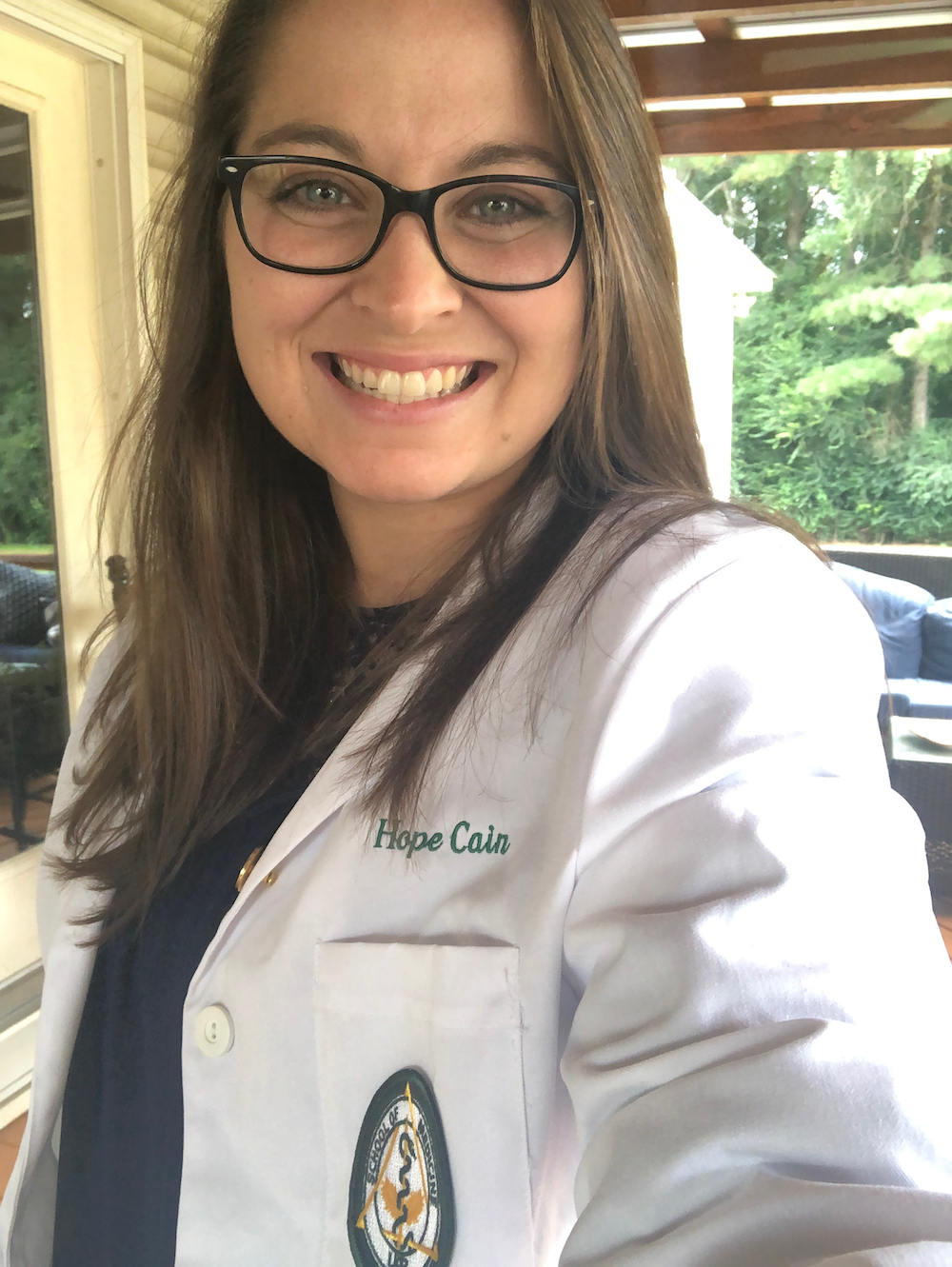 Hometown
Hometown
Hartselle, AL
Undergraduate school
University of Mobile
Why did you choose to come to UAB?
I chose to come to UAB because it felt like home when I was on campus and where I am supposed to be. The faculty and staff here are amazing and willing to help! I could not imagine learning anywhere else.
Why did you choose to join FMIG and are interested in Family Medicine?
I choose to join FMIG because I want to bring awareness to the multiple opportunities one can have through Family Medicine. I want more people to understand just what all Family Medicine can provide for patients.
What are you most looking forward to about being on FMIG leadership this year?
I am most looking forward to connecting to students and faculty.
What is your advice for upcoming MS1s as they come to campus this summer?
Have fun! Enjoy and learn as much as you can because it flies by!
Dalton Frederick
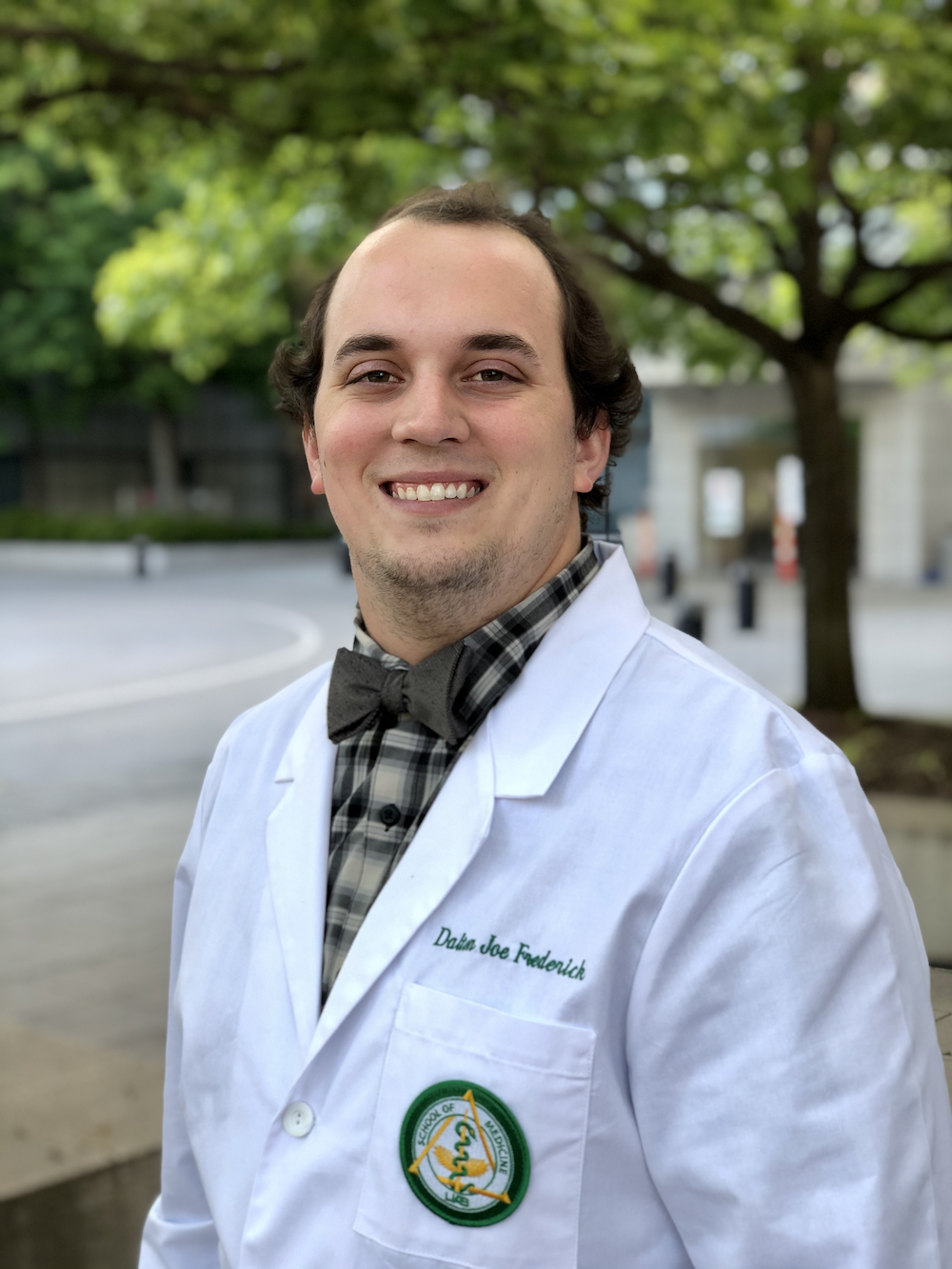 Hometown
Hometown
Hamilton, AL
Undergraduate school
UAB
Why did you choose to come to UAB?
I chose UAB as part of joining the Rural Medical Program. The reputation and vast support for family medicine in rural areas were a big factor in coming here. I loved the atmosphere here as an undergraduate and wanted to continue this as part of UAB SOM.
Why did you choose to join FMIG and are interested in Family Medicine?
I choose to join FMIG to show how great an opportunity that family medicine can be. It’s a rewarding specialty that is increasingly needed in all different areas, especially rural ones. In family medicine, an individual can treat an entire family and be an integral part of a community.
What are you most looking forward to about being on FMIG leadership this year?
I am most excited about collaborating with different physicians in family medicine to be given a platform to talk about their professions with medical students. There are many opportunities in family medicine in many different areas.
What is your advice for upcoming MS1s as they come to campus this summer?
My best advice for upcoming MS1s is not to rush everything. Make as many friends and connections as you can from the start.
Fallon Lalor
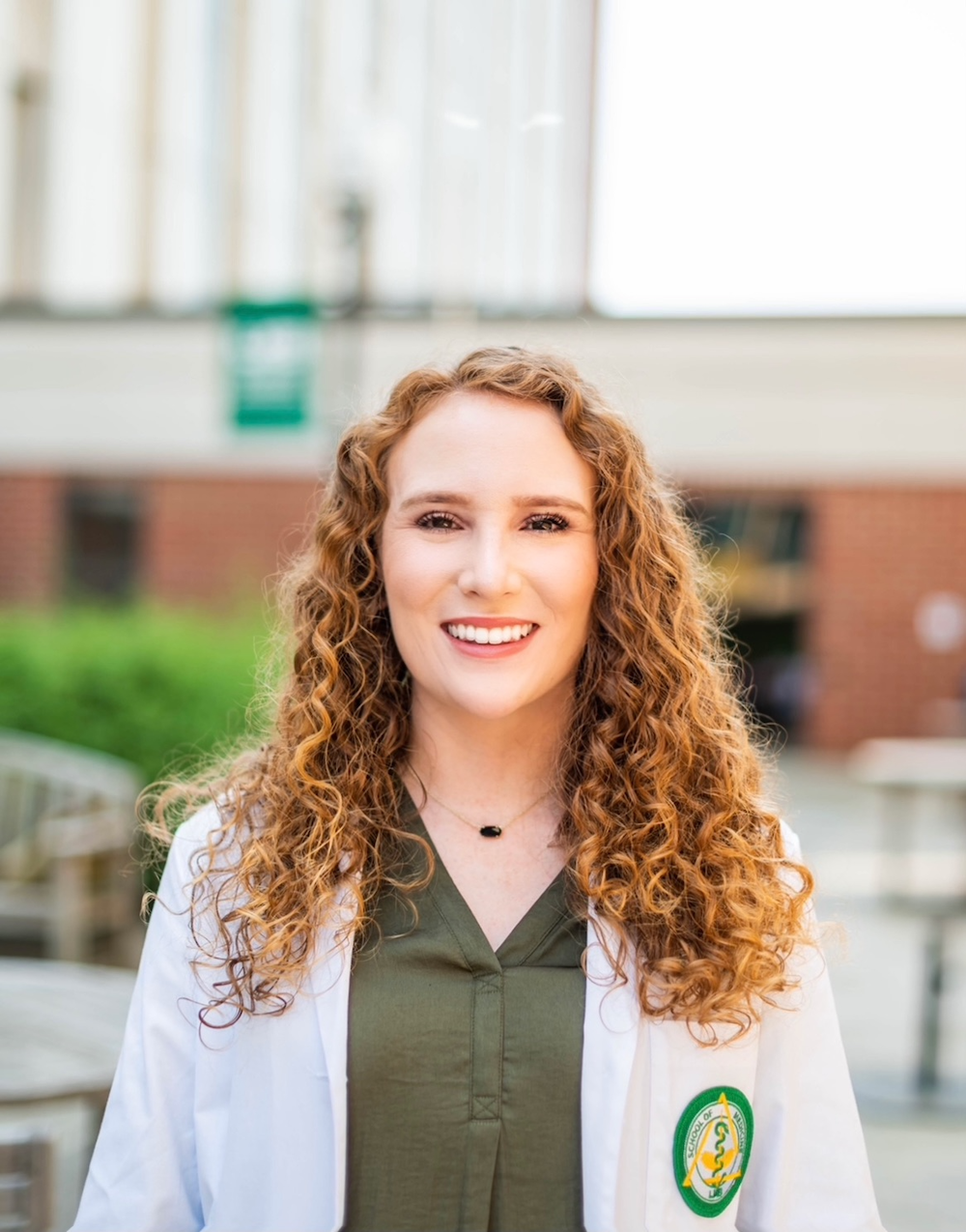 Hometown
Hometown
Grant, AL
Undergraduate School
UAB
Why did you choose to study at UAB School of Medicine?
I chose UAB because of the opportunities provided by the Primary Care Track to develop longitudinal relationships with patients. I will do my clinical rotations in Tuscaloosa, and I look forward to the unique opportunities to learn clinical skills in an environment that is focused on Primary Care and service.
Why did you choose to join FMIG and why are you interested in family medicine?
I chose to join FMIG because I have been interested in the field since I shadowed a Family Medicine physician for several weeks as an undergraduate student. I was inspired by the physician's dedication to improving his patients' quality of life and helping them overcome the obstacles that impeded their access to care. Family Medicine physicians have the unique ability to walk with patients from birth until the end of their lives and that is what appeals to me the most about the field.
What are you most looking forward to about being on FMIG leadership this year?
I am looking forward to educating the incoming first-year medical student class about the field of Family Medicine because I think many students don't realize the opportunities Family Medicine physicians have to work with underserved populations and serve as a leader in their community.
Any advice for upcoming MS1s?
My advice for upcoming MS1s is to come in with an open mind and make as many friends as you can!
Claire Wilson
 Hometown
Hometown
Birmingham, AL
Undergraduate School
UAB
Why did you choose to study at UAB School of Medicine?
I came to UAB because of the amazing faculty! After a great experience at UAB getting my undergraduate degree, I couldn’t imagine leaving this community.
Why did you choose to join FMIG and why are you interested in family medicine?
I chose to join the executive committee to increase awareness of family medicine and all the great opportunities it can afford physicians. I am excited to learn about all the wonderful things family medicine does for the Birmingham community.
What are you most looking forward to about being on FMIG leadership this year?
I am most excited to engage with my fellow students and plan programs that are interesting and helpful to them.
Any advice for upcoming MS1s?
I would tell an incoming MS1 to take advantage of all of the wonderful social events because getting to know my classmates has been so fun.
Women's History Month: Department Spotlights
For Women's History Month, we are spotlighting a few of the amazing women in the Department of Family and Community Medicine in collaboration with the UAB School of Medicine's "Women Making History" series. Read below about how they are making history in the mission areas of teaching, outreach, diversity, and clinical areas.
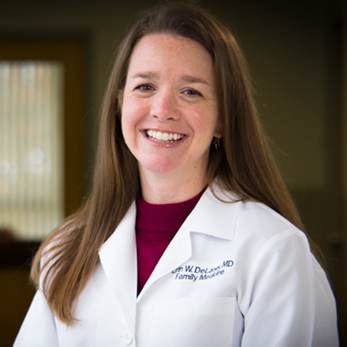 Erin DeLaney, M.D., vice chair for Clinical Affairs and Quality, is a physician, educator, wife, mother, daughter, and friend. A family medicine physician with years of award-winning experience, DeLaney is the first woman to gain a senior leadership position with the Department of Family and Community Medicine, as well as securing a vice-chair role.
Erin DeLaney, M.D., vice chair for Clinical Affairs and Quality, is a physician, educator, wife, mother, daughter, and friend. A family medicine physician with years of award-winning experience, DeLaney is the first woman to gain a senior leadership position with the Department of Family and Community Medicine, as well as securing a vice-chair role.
DeLaney is responsible for managing the day-to-day operations of all family medicine clinics at UAB and for pursuing practice transformation research and implementation to improve patient care and outcomes. A pioneer in the department, DeLaney says, “My role as a clinical leader is to help our team expand the reaches of high quality primary care. That means looking at ways to improve access to patients and how we can deliver on things that really matter in the long run when it comes to one’s health. We also have to constantly ask the questions of how can we make things better both for our patients and providers.”
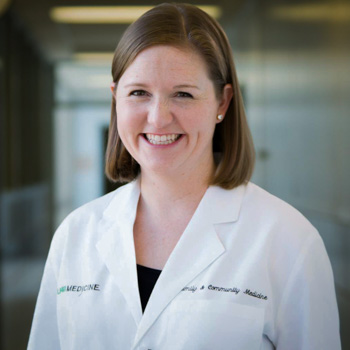 Jill Marsh, M.D., is an award-winning clinical provider and a clinical skills instructor committed to bettering the world through medical education and advocating for those with limited access to quality care in our state and beyond.
Jill Marsh, M.D., is an award-winning clinical provider and a clinical skills instructor committed to bettering the world through medical education and advocating for those with limited access to quality care in our state and beyond.
As director of the CU2RE: Urban Underserved Pathway program, she collaborates with dozens of providers and leaders across campus to ensure that the inaugural cohort students are well trained to care for underserved populations.
 Brandi Shah, M.D., MPH, is the director of the department’s Office of Identity, Inclusion and Collective Conscience (I2C2). She also serves students in the Student Health Services clinic and teaches courses in the School of Medicine.
Brandi Shah, M.D., MPH, is the director of the department’s Office of Identity, Inclusion and Collective Conscience (I2C2). She also serves students in the Student Health Services clinic and teaches courses in the School of Medicine.
Through I2C2 and other leadership positions, Shah provides resources, support and programming to advance the department’s mission for genuine inclusivity, intercultural exchange and progress toward racial and social justice. The office has facilitated listening sessions with all department stakeholders, started a monthly book club for continued discussions, created an inclusive, cultural calendar to increase community-building and awareness amongst the team, and implemented a medical education elective to teach medical students about the power of narrative practice and cultural humility in the patient-provider relationship.
Shah is a champion of her teammates and inspires intentionality and lifelong learning through her example of leadership and self-improvement.
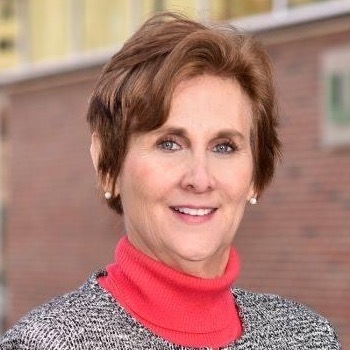 Glenda Stanley, MA, is the associate director of the Alabama Statewide Area Health Education Center program. The AHEC (Area Health Education Centers) program was developed by Congress in 1971 to recruit, train and retain a health professions workforce committed to serve underserved populations.
Glenda Stanley, MA, is the associate director of the Alabama Statewide Area Health Education Center program. The AHEC (Area Health Education Centers) program was developed by Congress in 1971 to recruit, train and retain a health professions workforce committed to serve underserved populations.
Stanley joined UAB as faculty in the School of Nursing and as the Associate Director of the Alabama Statewide AHEC Program in 2015. AHEC is about ensuring that students in rural and underserved areas have the opportunity to get an education that can change the quality of life for them and also future generations and the community at large.
Stanley served in many capacities in AHEC through the years, each advancing the growth of the organization. As a leader, she advises young professionals to do the following: 1) to act with integrity; 2) to be fair; 3) to have fun and 4) to be socially responsible.
We are grateful for all of our female leaders and those who contribute to the important work done in our department each day.
Celebrate National Nutrition Month with healthy meal ideas from our faculty
Celebrate National Nutrition Month with the Department of Family and Community Medicine by trying these healthy and delicious meal ideas from faculty members.
Caroline Cohen, Ph.D., R.D., a registered dietician and assistant professor in the department, regularly counsels patients on healthy eating and how to incorporate positive habits into daily life.
“Developing healthy eating habits looks a little different for everyone,” said Cohen. “As a way to celebrate National Nutrition Month, we wanted to show how providers in the department incorporate healthy eating into daily life.
Breakfast
Caroline Sullivan, DNP, RN, FNP-C, is a nurse practitioner at the UAB Highlands Family and Community Medicine clinic. For Sullivan, breakfast often includes whole grains and low-fat protein.
“My typical weekend breakfast is a healthier spin on a classic breakfast plate,” said Sullivan. “I scramble two eggs with a pinch of cheese and “Everything but the Bagel” seasoning. I toast a piece of Ezekiel Bread, which is a flourless whole-grain bread packed with sprouted grains and zinc, fiber and iron. I’ll finish with a few pieces of turkey bacon, which has 35% less fat and calories than pork bacon.”
Sullivan also enjoys baking healthy and kid-friendly muffins for an easy, on-the-go breakfast. They include applesauce, whole wheat flour, flaxseed, almond milk, eggs and shredded fruits and veggies for added vitamins.
Lunch
Sumayah Abed, M.D., assistant professor, provides details about nutrient-rich lunches that she and her family eat.
“Our typical lunch consists of a main dish and two side dishes, usually salad and rice,” said Abed.
She noted that while the recipes can include chicken or red meat, she often substitutes those with nutrient-dense proteins like shrimp or fish that have less saturated fat. Abed also prepares a tomato and okra soup to mix with the rice for a fruit and vegetable add-on.
Abed’s family enjoys sweets after each meal, but she says that does not mean that they have to eat a lot of sugar. She prepares sweet rolls with pistachio and coconut to provide a healthier dessert option.
Dinner
“Generally, my guiding nutrition philosophy is a high-fiber and low-sugar diet,” said Cohen. “By emphasizing high fiber foods, like vegetables, fruits and whole grains, and avoiding added sugar, patients may reap a variety of benefits including stabilizing blood sugar, lowering cholesterol, decreasing inflammation and improving gut health, all of which may prevent disease.”
For dinner, Cohen prepares nutritious meals like Mediterranean turkey burgers with a salad and roasted sweet potatoes.
“I made these burgers by combining lean ground turkey, chopped sun-dried tomatoes and fresh basil,” said Cohen. “I served mine on top of a salad with a red wine vinaigrette and feta cheese. On the side, I roasted some purple sweet potatoes. I chose the purple color and cut with a crinkle cutter to encourage my two kiddos to eat them like French fries.”
Snacks
Cohen also suggested some easy snack options with added health benefits like crunchy broad beans or popcorn. Both these snacks are high in fiber and come in plenty of flavors. Broad beans also contain high levels of folate, said Cohen, which is important for women who are interested in having children.
As each meal shows, healthy eating does not mean boring eating. These plates contain color, flavor and fresh ingredients that offer the eater health benefits and tasty meal ideas.
Recipe for Nutritious Toddler Muffins:
1 & 1/3 cup whole wheat white flour (complex carb)
3 tbsp coconut sugar
1 tbsp milled flax seed (Omega 3 fats)
3 tsp baking powder
¾ cup rolled oat (Fiber)
¼ cup melted butter
2 eggs (protein)
¾ cup almond milk (Vit E & calcium)
¼ cup apple sauce
¼ cup shredded carrots (Vit A)
¼ cup blueberries (Antioxidants)
½ sliced banana
Mix the dry ingredients and wet ingredients separately, then add together. Bake at 375 degrees F for 9-12 min
McKeag receives inaugural President’s Award for Excellence in Shared Values
 Ian McKeag, M.D., M.S., assistant professor of family and community medicine and director of the Family and Community Medicine Sports and Exercise Medicine Fellowship, has been selected as one of the recipients of the inaugural President’s Award for Excellence in Shared Values. The award honors Blazers who demonstrated one or more of UAB’s shared values in the course of their work during the extraordinary times presented by the COVID-19 pandemic. The 20 members of the inaugural class of 2021 represents five schools and six institutional units across UAB.
Ian McKeag, M.D., M.S., assistant professor of family and community medicine and director of the Family and Community Medicine Sports and Exercise Medicine Fellowship, has been selected as one of the recipients of the inaugural President’s Award for Excellence in Shared Values. The award honors Blazers who demonstrated one or more of UAB’s shared values in the course of their work during the extraordinary times presented by the COVID-19 pandemic. The 20 members of the inaugural class of 2021 represents five schools and six institutional units across UAB.
Read more from the UAB Reporter
Dr. McKeag personifies the shared values of integrity, collaboration and excellence and achievement. Colleagues say he maintained “immense integrity” while volunteering at the COVID-19 Respiratory Clinic during the pandemic.
McKeag served his patients in a high-risk environment with compassion and excellence, despite having a newborn at home, a nominator says, which demonstrates his “above-and-beyond commitment to work and professional excellence.” He also worked with clinicians in other units to continue providing essential care to the community.
“His humility in serving and putting others before his interests outside of his required duties further proves McKeag’s integrity as a physician and person,” a nominator said.
Join our email lists!
Tips to keep your heart healthy this Valentine's Day
 The heart is on many people’s minds this time of year. Apps and online articles offer advice on how to find love and give the heart what it wants. Faculty members from UAB’s Department of Family and Community Medicine have gathered tips about cardiovascular health that will ensure the heart is ready for anything that this year may bring.
The heart is on many people’s minds this time of year. Apps and online articles offer advice on how to find love and give the heart what it wants. Faculty members from UAB’s Department of Family and Community Medicine have gathered tips about cardiovascular health that will ensure the heart is ready for anything that this year may bring.
Check in with loved ones to keep your stress levels low.
Relationships play a major role in heart health by helping to regulate stress, according to Kaylee Crockett, Ph.D., assistant professor and clinical health psychologist for the department.
“Next time you’re feeling stressed take a minute to close your eyes and picture a loved one in your mind - be that your significant other, a family member or friend, or a beloved pet - and notice how your body and state of mind change,” said Crockett. “Of course, if that person or pet is nearby you can ask them for a hug or to hold your hand and talk things through with them.”
Prioritize healthy eating habits to protect the heart.
According to Caroline Cohen, Ph.D., R.D., assistant professor and clinical dietitian for the department, diet can impact heart health. Cohen recommends eating omega-3-fatty acids that reduce the risk of cardiovascular disease and decrease inflammation. Fish, especially mackerel, salmon, and tuna, are high in omega-3-fatty acids and are a great source of protein.
It is also important to incorporate plenty of fiber into a heart-healthy diet, said Cohen. Fruits, vegetables, and whole grains contain fiber that can reduce cholesterol and inflammation in the body. By prioritizing foods that include these and other necessary nutrients, a balanced diet can lead to a stronger, healthier heart.
Exercise regularly to strengthen the cardiovascular system.
Irfan Asif, M.D., chair of the Department of Family and Community Medicine and certified family and sports medicine physician, recommends regular exercise to boost cardiovascular health. According to the World Health Organization (WHO), failing to exercise can increase the risk for diabetes, obesity, heart attacks, and other diseases. The U.S. Department of Health and Human Services provides guidelines for physical activity for every age group on their website.
“Regular exercise is one of the most important things people can do to improve their health,” said Asif. “Even during the COVID-19 pandemic, I encourage my patients to go outside and exercise. Exercise is the best medicine for your health and heart.”
By taking steps to keep the heart healthy, the entire body benefits. Learn more about cardiovascular health and preventive measures by talking with a family medicine or primary care provider.
Happy Valentine’s from the Department of Family and Community Medicine.
